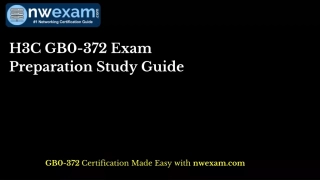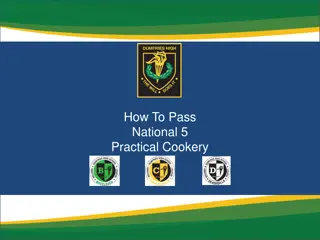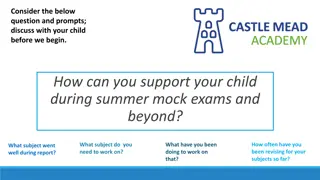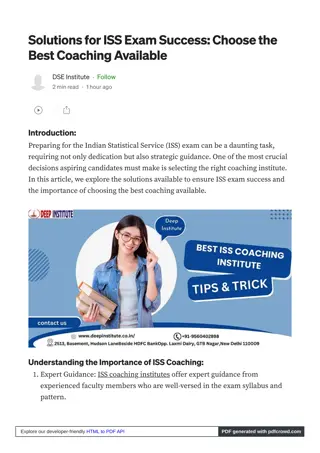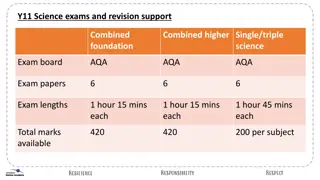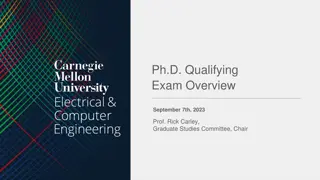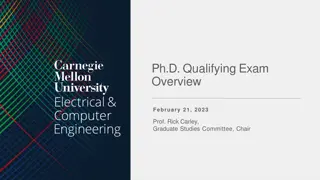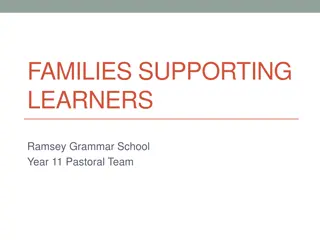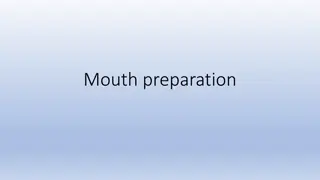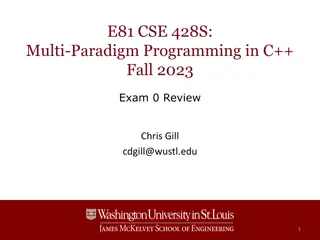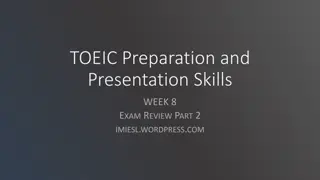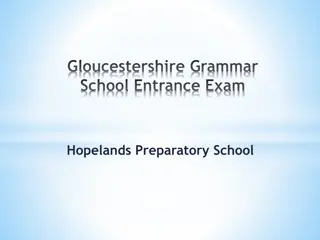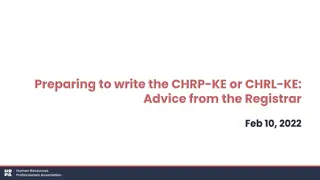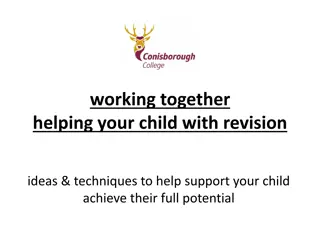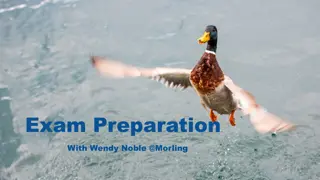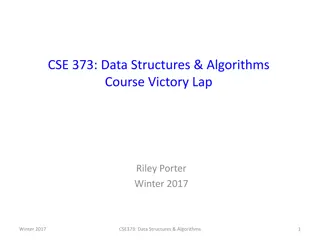Supporting Your Child's Exam Preparation: A Comprehensive Guide
In this guide, you will find valuable tips and strategies to support your child during their exam preparation. From creating a study schedule to getting involved in their learning process, these resources offer practical advice on how to help your child succeed academically. Explore techniques for effective revision, organizing study sessions, and motivating your child to excel. Get insights on subject audits, exam techniques, and the importance of a balanced approach to studying. Equip yourself with the tools needed to assist your child through this crucial period of academic growth.
Download Presentation

Please find below an Image/Link to download the presentation.
The content on the website is provided AS IS for your information and personal use only. It may not be sold, licensed, or shared on other websites without obtaining consent from the author. Download presentation by click this link. If you encounter any issues during the download, it is possible that the publisher has removed the file from their server.
E N D
Presentation Transcript
FAMILIES SUPPORTING LEARNERS Ramsey Grammar School Year 11 Pastoral Team
Amount of Revision Not enough Too much ------------------------------------------------------------------------------ All students are somewhere along this line
Getting Started The hardest part of any task is getting started
Getting Organised Draw up a timetable
Monday Tuesday Wednesday Thursday Friday Maths English Science PE 4.00 - 4.30 Maths English Business Science PE 4.30 - 5.00 Business Science 5.30 - 6.00 History Music English 6.00 - 6.30 History Music Business 6.30 - 7.00 Maths Business 7.00 - 7.30 Drama Maths 7.30 - 8.00 Drama 8.00 - 8.30
Get Involved Look through the plan at home with your son or daughter Discuss the workload Set realistic targets Agree on the plan together Make time for rest and relaxation
Getting Motivated Regular and manageable amounts of study Rewards Praise
What to learn? Preparation for exams has two core components 1. Subject knowledge 2. Exam Technique Leading up to exams lessons in school will focus more on exam technique Revision at home can be aimed at improving both areas but particularly subject knowledge
How to revise? All students learn in different ways Variety in techniques is important to keep things interesting Reading through notes/books Online quizzes Yacapaca, BBCbytesize,Vocabulary.com Podcasts GCSE Pod Subject specific YouTube videos Practice questions Completing past exam papers Flash cards
Subject Audit During PGE lessons in February students will be doing subject audits. This process should help them to identify topics which they are stronger or more confident in than others. This should then help students prioritise their revision at home. This is something which parents can become involved in as well.
Study Space The ideal study space is a quiet place in the house with a table so materials can be laid out. Some students will spend the first 20 minutes of their study time just looking for somewhere to study. A key to ongoing time management is to find a dedicated study space free from distractions where they can concentrate. This may not be their bedroom!
Other stuff Get to grips with the what, how and why of the process Allow time for relaxation Reasonable bed time Good diet Exercise/Fresh air
Why? The message for students It s a competitive world Make your own decisions/choices Support yourself and your desired lifestyle Own your own home
Day Monday Lunch English drop in session room 203 Business help and support in Social Science area Geography catch up in Mrs Barker s room Product Design D&T area Rural & Agriculture Rural classroom After school Maths Maths classrooms Product Design D&T area Rural & Agriculture Rural classroom Physics Lab 6 Food and Nutrition Mrs Gleghorn s room Product Design D&T area Rural & Agriculture Rural classroom Food and Nutrition Mrs Gleghorn s room Maths Maths classrooms Rural & Agriculture Rural classroom Physics Lab 6 Tuesday Geography - catch up club in room 112 Languages Support club in room 18 Product Design D&T area Rural & Agriculture Rural classroom Biology Lab 9 History in room 204 Maths Maths classrooms English Mrs Owen s room Rural & Agriculture Rural classroom Wednesday RE Support in room 12 Product Design D&T area Physics Lab 6 Staff meetings every week Thursday PE - Catch up & Revision, Sports hall classroom Product Design D&T area Rural & Agriculture Rural classroom Physics Lab 6 History in room 204 Maths Maths classrooms Rural & Agriculture Rural classroom Physics Lab 6 Friday
Key Dates Exams start: Finish: 2nd May 2018 20th June 2018 Last day of school: 25th May 2018
What next? Sixth Form at RGS Best option for A level courses of study College Best option for Vocational courses Job Some options out there CV/Letters









